RELG 402 - World's Living Religions
ISKCON
Click on thumbnails for larger photos
ISKCON - The International Society for Krishna Consciousness - was founded by A. C. Bhaktivedanta Swami Prabhupada in New York, in 1967.
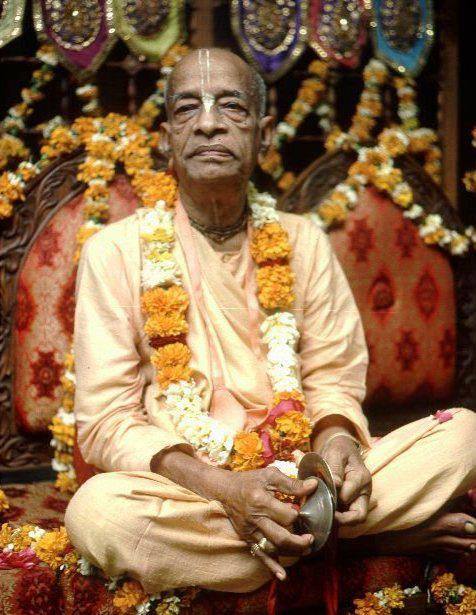 A. C. Bhaktivedanta Swami Prabhupada (1896-1977) was a member of the Vaishnava branch of Hinduism - those who worship Vishnu in the form of Krishna.
A. C. Bhaktivedanta Swami Prabhupada (1896-1977) was a member of the Vaishnava branch of Hinduism - those who worship Vishnu in the form of Krishna.
In 1959 he took sannyasa, the vows of renunciation, and became a Vaishnavite monk. He traveled throughout India, teaching and preaching, and wrote many books on his religious insights.
In 1965 he sailed to the USA with very little financial support, and began to preach in New York.
In 1966 he founded the International Society for Krishna Consciousness (ISKCON)
 Within a year he had gathered a band of followers and had established a store-front temple in New York. He continued to travel and preach throughout the USA and the rest of the world, preaching and teaching, gathering followers, building schools and temples, and setting up farming communities.
Within a year he had gathered a band of followers and had established a store-front temple in New York. He continued to travel and preach throughout the USA and the rest of the world, preaching and teaching, gathering followers, building schools and temples, and setting up farming communities.
Bhaktivedanta Swami thought of Jesus, Moses, and Muhammad as "Empowered Representatives of God" (Krishna), and declared that Krishna was the same as Christ. He taught that the Vedic scriptures commanded people to chant the name of God - in this case Krishna.
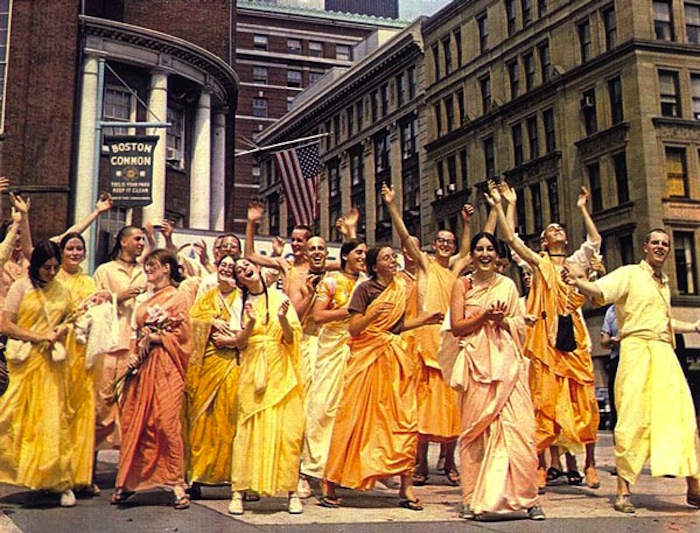
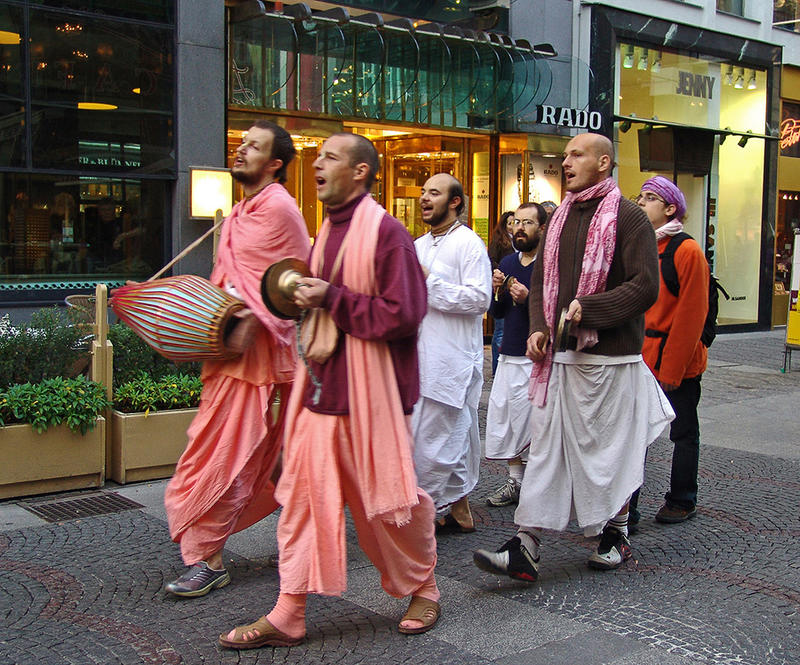 Followers of ISKCON practice bhakti yoga, where they chant the name of Krishna several times a day. They are noticeable for the saffron-yellow robes that they wear. These yellow robes denote a Hindu renunciate monk, but the West is not familiar with other renunciate Hindus, so generally associates such robes only with members of ISKCON.
Followers of ISKCON practice bhakti yoga, where they chant the name of Krishna several times a day. They are noticeable for the saffron-yellow robes that they wear. These yellow robes denote a Hindu renunciate monk, but the West is not familiar with other renunciate Hindus, so generally associates such robes only with members of ISKCON.
ISKCON disciples hold that Krishna is the highest form of God - all other form are avatars, and Krishna is the source of the avatars. They refer to Krishna as "The Supreme Personality of the Godhead". However, they also worship his divine female partner, Radha, who represents divine love.
Bhaktivedanta Swami gave his disciples four principles for regulating their lives.
- No eating of meat, fish, or eggs
- No sex except between a married couple, and then only for the purpose of conceiving children
- No gambling
- No intoxicants - no alcohol, caffeine, tobacco, or other recreational drugs
ISKCON also requires the "Four Legs of Dharma"
- Daya - Mercy
- Tapas - Self-control, Austerity
- Satyam - Truthfulness - No games or make-believe
- Saucam - Cleanliness of body and mind
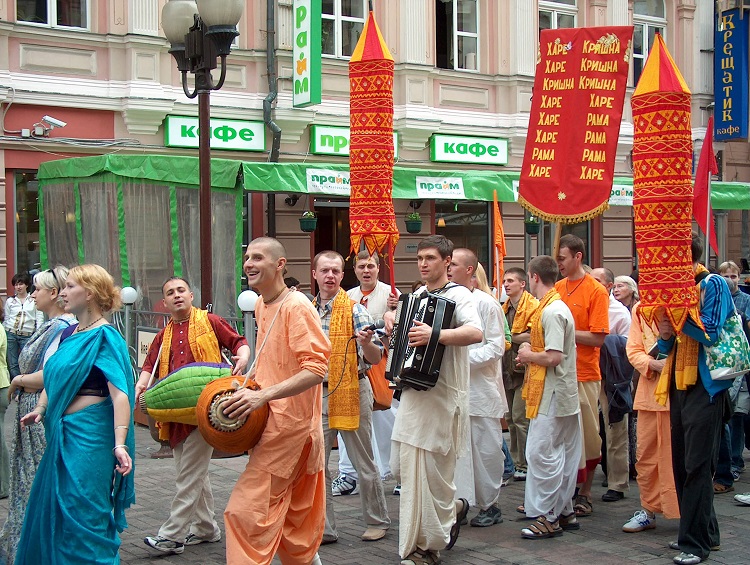
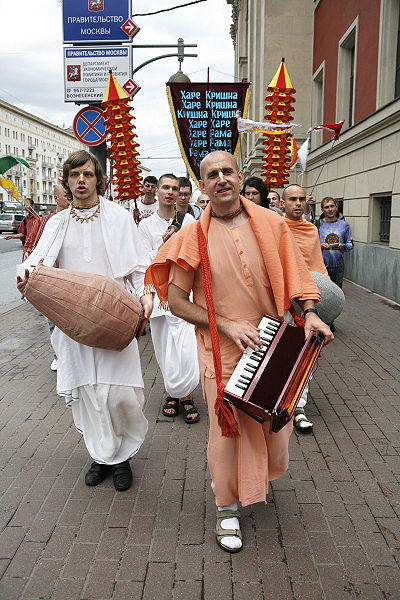 Members of ISKCON try to spread Krishna Consciousness by preaching and chanting in the streets, by handing out literature, particularly books and pamphlets by Bhaktivedanta Swami. They have been particularly successful in Russia and lands of the former Soviet Bloc - after the disintegration of the USSR the restrictions against religions were relaxed, and the people were free to seek spiritual values.
Members of ISKCON try to spread Krishna Consciousness by preaching and chanting in the streets, by handing out literature, particularly books and pamphlets by Bhaktivedanta Swami. They have been particularly successful in Russia and lands of the former Soviet Bloc - after the disintegration of the USSR the restrictions against religions were relaxed, and the people were free to seek spiritual values.
Devotees of ISKCON are often known as "Hare Krishnas" because of the Maha Mantra (Great Mantra) that they recite several time a day, and chant in the streets (usually with microphones and amplifiers). The mantra uses three of the divine names as an invocation.
Hare Krishna Hare Krishna
Krishna Krishna Hare Hare
Hare Rama Hare Rama
Rama Rama Hare Hare
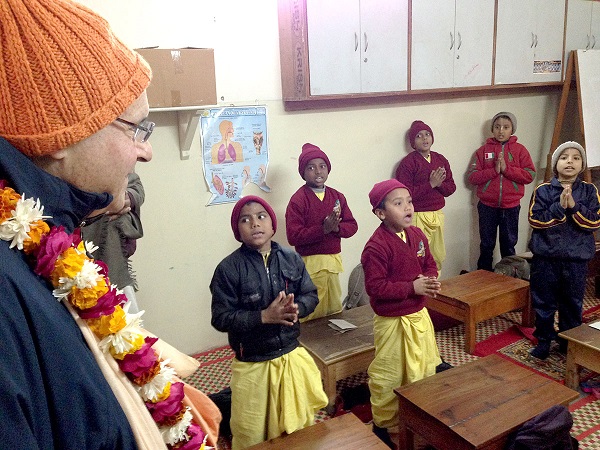 ISKON promotes education, particularly with an emphasis on Krishna Consciousness, so many schools and college have been founded world-wide.
ISKON promotes education, particularly with an emphasis on Krishna Consciousness, so many schools and college have been founded world-wide.
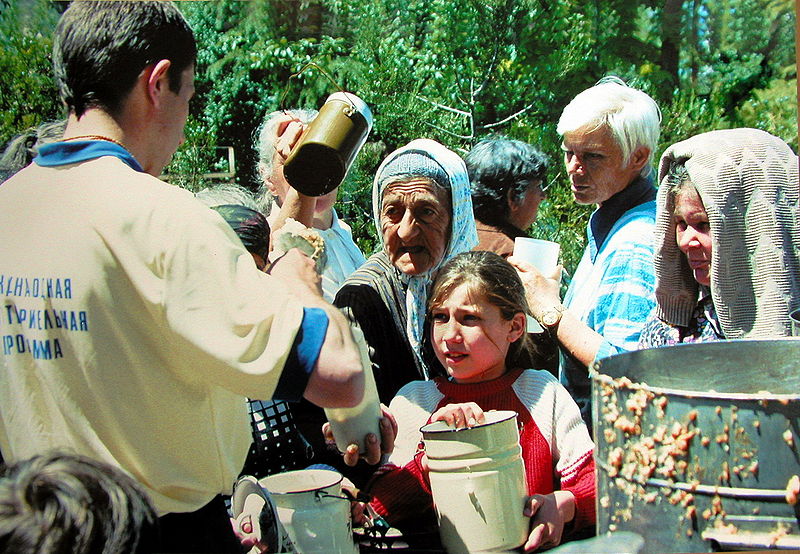 From the early days of ISKCON Bhaktivedanta Swami stressed a ministry of serving purely vegetarian meals to all in need. He stated that "No one within ten miles of a temple should go hungry". ISKCON now runs a program called "Food for Life" which prepares and serves thousands of free meals every day throughout the world.
From the early days of ISKCON Bhaktivedanta Swami stressed a ministry of serving purely vegetarian meals to all in need. He stated that "No one within ten miles of a temple should go hungry". ISKCON now runs a program called "Food for Life" which prepares and serves thousands of free meals every day throughout the world.
In preparation for the future of ISKCON after his death, Bhaktivedanta Swami set up a governing board in 1970, the "Governing Body Commission" or GBC, charging them with improving the standards of temple management, spreading Krishna Consciousness, distributing books and literature, opening new centers, and educating devotees.
Bhaktivedanta Swami had specified that members of the GBC were to be elected by Temple presidents, but that was not followed, and the GBC started electing its own members. Some of Bhaktivedanta Swami's disciples became gurus, and started moving in other directions, causing schisms, excommunications, and various scandals involving charges of brain-washing, kidnapping young girls, sexual improprieties or abuse, financial irregularities, and racketeering.
Devotees of ISKCON regard Bhaktivedanta Swami as divine, and some of the succeeding gurus also claimed divinity for themselves.
Copyright © 1999 Shirley J. Rollinson, all Rights Reserved